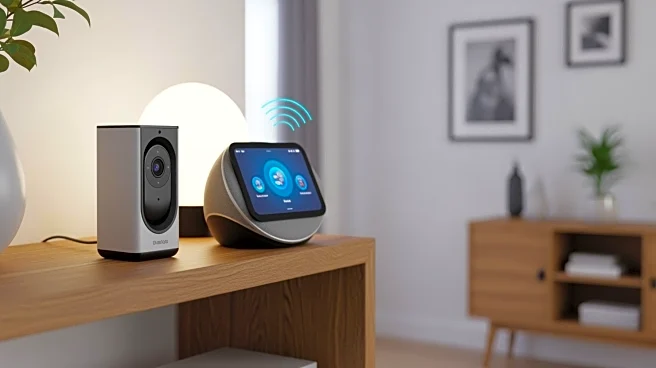What's Happening?
Recent advancements in home AI technology are significantly improving security and convenience for U.S. households. These technologies include smart speakers and home security services that can detect
fire alarm sirens, breaking glass, and other warning signs, sending real-time alerts to homeowners. Additionally, AI features such as package recognition, presence-sensing thermostats, and pet activity monitoring are becoming more prevalent. These systems utilize advanced algorithms to interpret sounds and visual content, providing users with detailed alerts and recommendations. The integration of conversational AI is also enhancing user interaction, allowing for more natural dialogue with voice assistants.
Why It's Important?
The integration of AI in home technology represents a significant shift in how households manage security and daily operations. By providing real-time alerts and detailed monitoring, these systems offer increased safety and peace of mind, potentially reducing the risk of theft or damage. The ability to recognize and respond to various environmental cues can lead to more efficient energy use and cost savings. Furthermore, the development of conversational AI enhances user experience, making technology more accessible and intuitive. As these technologies become more widespread, they could lead to broader adoption and innovation in smart home solutions.
What's Next?
As AI technology continues to evolve, we can expect further enhancements in smart home systems. Companies may introduce more sophisticated features, such as improved accuracy in pet activity monitoring and expanded capabilities in conversational AI. The ongoing development of these technologies could lead to increased competition among tech companies, driving innovation and potentially lowering costs for consumers. Additionally, privacy concerns may arise, prompting discussions on data security and ethical use of AI in home environments.
Beyond the Headlines
The rise of AI in home technology raises important ethical and privacy considerations. As these systems become more integrated into daily life, questions about data collection and user consent will become increasingly relevant. The potential for AI to monitor and analyze personal habits could lead to debates on the balance between convenience and privacy. Furthermore, the widespread adoption of these technologies may influence cultural norms around home security and personal interaction with technology.









